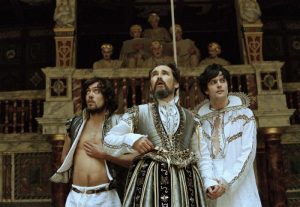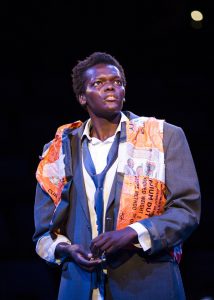FERDINAND Where should this music be? I’th’ air, or th’earth?
It sounds no more, and sure it waits upon
Some god o’th’ island. Sitting on a bank,
Weeping again the King my father’s wreck,
This music crept by me upon the waters,
Allaying both their fury and my passion
With its sweet air. Thence I have followed it
(Or it hath drawn me, rather) but ’tis gone.
No, it begins again. (1.2.388-396)
Ferdinand had no scripted lines in the storm scene, so this is his first speech in the play – baffled, wondering, preoccupied, shocked with trauma and grief. (Quite a big number to begin with.) He cannot see Ariel – invisible – or the spirits, but his first question is about the music: where was it coming from and where has it gone? – rather than where am I? (Compare the shipwrecked Viola in Twelfth Night: ‘What country, friends, is this?’ And also, given what Ferdinand goes on to say, Orsino’s speech in the opening scene of that play too: ‘If music be the food of love, play on, | Give me excess of it that, surfeiting, | The appetite may sicken and so die’.) Music moves, it does things to the body, the mind, the soul: here Ferdinand remarks that the music has soothed him, temporarily relieved his passion, his grief for his father’s apparent death, and also, apparently, calming the fury of the stormy waves. The scene he describes is vivid: he was sitting on a bank, as if he’d dragged himself ashore and collapsed on the first patch of higher ground. He was weeping again the King my father’s wreck – a sense of helplessness, as if the sheer physical effort of landfall had interrupted his mourning, even made him temporarily forget his loss – only for it to be renewed, again, once he was safe on land. The dual title is interesting; it’s partly the metre which prefers the King my father’s wreck over the more disrupted ‘my father the King’s wreck’, of course, but it emphasises Ferdinand’s propriety and courtesy, and also the dual nature of his loss, having lost both father and sovereign – and perhaps also recognising in this moment that if his father the King is dead, then Ferdinand is now king himself, a terrifying, absurd prospect in this moment where he has no idea where he even is. The music, he said, crept by me upon the waters – as if it were coming from across the sea, or under the sea, itself. Its creeping makes it soft, secretive, stealthy, and even sensual. (Lorenzo to Jessica in Merchant of Venice: ‘How sweet the moonlight sleeps upon this bank! | Here will we sit, and let the sounds of music | Creep in our ears…’) Ferdinand has been drawn by this enchanting music, just as Ariel (and apparently Prospero) intended. He thinks that the music is divine, that it waits upon some god o’ th’ island– and when it ceases, albeit temporarily, he is bereft: ’tis gone. (And it seems as if not only Ariel but Miranda and Prospero are invisible too, as Ferdinand is enraptured with music, and bewildered with grief.)



